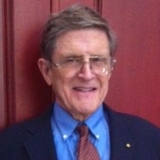
The pager beeps the end of my sleep. It’s midnight; I’m the one on call. I quickly rise to make my way through basement tunnels where ancient pipes crisscross the ceilings, scuffs of gurneys mark the walls. Caged faint bulbs light the way, as they have for scores of interns over decades before.
I board the creaking lift to examine the newest patient, an alcoholic with liver disease who’s in full DTs, then walk down the darkened hallway, enter each half-open door. Most of my patients sleep with their diseases, the eyes of the others reveal their fears. A homeless guy with frost-bitten feet seeks to survive the freezing northeastern winter. An aging hooker with acute PID has nowhere else to spend the night. A grizzled old man with pneumonia breathes fast, then shallow, coughs up putrid secretions that tell me that his death is near. The remaining sick suffer other diseases, each one requiring my full attention.
The duty nurse, who’s twice my age, asks which orders I’d like to change. I write down what seems best for each one’s survival through the night. At six a.m., a glimmer of sun shines through the belching factory smoke of our city in its aging decay. As the nurse prepares to leave her station, her thanks tell me I’m now part of the healing profession.
